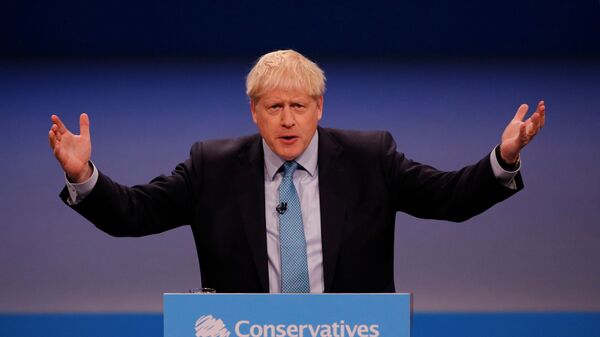UK Prime Minister Boris Johnson unveiled his new Brexit offer to the EU on Tuesday. It vows to terminate the Irish backstop from Theresa May's Withdrawal Agreement, a thorn in the side of consecutive Conservative administrations, with the intention of preventing the erection of a hard border in Ireland.
However, while the backstop may be technically removed, the plan replaces it by keeping Northern Ireland in the single market for goods, food and agricultural products, and the province will remain subject to laws established in Brussels.
Johnson delivered a four-page letter to the president of the European Commission, Jean-Claude Juncker, which outlined his plans to break the Brexit deadlock in Ireland. As well as a six page explanatory note from chief Brexit negotiator David Frost, and 40 pages of legal text replacing the backstop's inclusion in the Withdrawal Agreement.
One point of contention could be that it grants the Northern Irish government, which is currently suspended, the power to effectively scupper the entire plan every four years.
Today PM @BorisJohnson has set out a fair and reasonable compromise for replacing the backstop so we can get Brexit done by 31 October.
— UK Prime Minister (@10DowningStreet) October 2, 2019
➡️ https://t.co/V0Ay8MRmu3
Read the PM’s letter to the EU ⬇️ pic.twitter.com/JgFLpoNjUx
The main points of Johnson's demands are:
- The customs union will have no influence in either Britain or Northern Ireland.
- "An all-island regulatory zone on the island of Ireland, covering not just sanitary and phytosanitary and agri food rules, but all goods, thus eliminating regulatory checks for trade in goods between Northern Ireland and Ireland."
- Common regulatory alignment between Northern and the Republic of Ireland and a new border down the Irish Sea between Northern Ireland and Great Britain.
- Any goods, livestock or food moving from Great Britain to Northern Ireland will have to undergo customs checks to ensure consistency with EU regulatory standards. Brussels will continue to determine the standards for goods and food in Northern Ireland.
- Due to an effective continuation of Brussels law in Northern Ireland, if Stormont (the Northern Irish Parliament) is ever reconvened it will be able to vote every four years on whether it wishes the arrangement to continue.
- Stormont's decision is required six months prior to the establishing of the new all-island goods and food market, which is currently scheduled for the beginning of 2021. The consent of the Northern Ireland people, a majority of which supported remain would also have to be obtained every four years.
- Northern Ireland and the rest of the UK will still leave the EU's customs union leading to a degree of customs friction across the border. Johnson is however insistent that the majority of customs checks can happen in warehouses without the need for new physical infrastructure on the Irish border.
The governing Conservative Party have been reliant on Northern Ireland’s Democratic Unionist Party (DUP) for parliamentary support since teh 2015 general election and Johnson would most likely require their votes in parliament to get the deal through.
The DUP were privy to the plan before it was released last night. While they opposed former Prime Minister Theresa May's deal on the basis that it kept Northern Ireland in a separate economic arrangement to the rest of the UK, the primary objective of the Northern Irish Unionists, the four-year vote may assuage their concerns.
Boris Johnson is in precarious legal situation. An act of parliament known as the Benn act restricts him from pursuing a no deal Brexit and requires him to ask for an extension if he cannot propose a deal by 19 October, which the PM has repeatedly ruled out.


